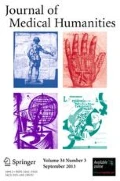Abstract
This paper asks for legislation that will remove criminal sanctions from good faith decisions by parents and physicians to allow severely defective newborns to die. In so doing it attempts to bring to satisfactory resolution conflicting points of view in the disciplines of moral philosophy, medicine, and law. This paper argues that euthanasia of severely defective newborns is morally justifiable and legally permissible within reasonable extensions of current interpretations of the Federal Constitution by the Supreme Court. It describes the medical dilemma, evaluates the moral issues involved, and delineates possible legal alternatives.
Similar content being viewed by others
Author information
Authors and Affiliations
Additional information
Claire Thomas is on the faculty of the University of Washington Women Studies Program and is an adjunct professor at Central Washington University.
Rights and permissions
About this article
Cite this article
Thomas, C. Potential for personhood: A measure of life the severely defective newborn, legal implications of a social-medical dilemma. Bioethics Quarterly 2, 164–193 (1980). https://doi.org/10.1007/BF00917063
Issue Date:
DOI: https://doi.org/10.1007/BF00917063




